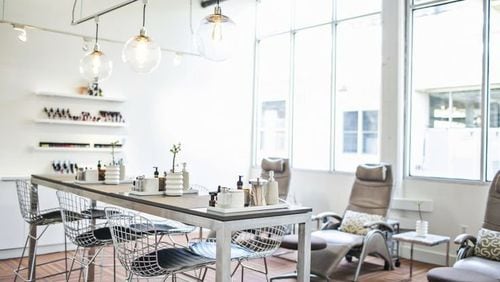Two weeks ago, the Internet exploded in response to a New York Times investigation of New York City area nail salons. The stories revealed unfair labor practices and poor working conditions of nail technicians, prompting readers to sound off about everything from immigration policies to tipping practices.
But while it all makes for good conversation, will it bring a change?
Anyone in the beauty industry will tell you these illegal practices happen everywhere, including metro Atlanta. But the industry continues to grow year over year, with spending on nail care approaching $9 billion in 2014, according to statistics from Nails Magazine. That isn’t because prices are going up and being passed on to workers in the form of higher wages. Many nail salons or technicians haven’t increased their prices in 10 years.
Almost a decade ago, I featured local businesses that offered alternatives to what I called strip mall nail salons — the places where you were most likely to encounter unhealthy practices, cheap prices and low-paid workers. Of the three nail salons I encountered back then, only 10Ten Nail Bar (from the founders of Natural Body Spa & Shop) is still around. Others have cropped up with a commitment to creating healthy experiences for customers while valuing their employees.
Rather than following the advice of some well meaning Times readers and increasing the tips you give your nail tech at a salon you suspect may not be paying fair wages or following industry sanctioned practices, why not just take your business to a place that does?
In 2009, Myka Barbato opened Wax Atlanta with the goal of creating a better waxing experience by using quality products and techniques. Three years ago, she expanded the concept to nails with BUFF Nail Bar. At the salon in Old Fourth Ward, they use toxin free polishes and do not offer acrylic enhancements which may cause health issues for workers. They follow state board regulations for sanitation and pay employees a living wage. The price for a mani/pedi is $55.
“I saw the (NYT) article and for me it was like, ‘Finally!’ It is part of the reason I opened BUFF. I was so tired of feeling like I was in very much a sweatshop type atmosphere,” she says. She understands the challenges of winning over customers who are accustomed to paying rock bottom prices for nail services and takes the time to explain to clients why they might pay a bit more at BUFF.
If it takes an hour and a half to do a mani/pedi and the price is at or below $30, she explains, the technician is making minimum wage or less. Tips will help in an honest shop where the money gets passed on, but in the shadier joints, employees may never see their tips at all. BUFF employees are paid hourly, above minimum wage and have scheduled breaks, she says. Still, she is hesitant to push too far. “If I pushed my manicures to $40, people would be horrified. At $25 we are making it, but with a razor thin margin,” she says.
Just nine weeks ago, Linda Sharp and Jody Hill opened Lark and Sparrow Nail Salon and Boutique in the Grant Park area. Sharp also wasn't surprised by the recent article and says, like Barbato, the issue is part of what prompted her to open a nail salon. "I knew stuff like this was going on in the industry. Anywhere that they are offering such discounted prices, you know that person isn't getting paid," she says. "I didn't want to go to any nail salons anymore. I was so uncomfortable."
Lark and Sparrow employees are paid hourly upon starting and work with toxin free nail products. The salon also does not use jetted tubs — the germ-filled basins that are almost never cleaned properly between clients — opting instead for a detox soak made in house and followed by hot towels. Manicures start at $25 and pedicures start at $30.
Sharp and Barbato suggest consumers looking for nail salons with quality practices pay attention and ask questions.
If you are concerned about worker wages, pay attention to price, says Sharp. If it is really cheap, workers aren’t getting paid. If your concern is your own health and safety, ask how they clean their tools. Make sure the salon itself is clean and if they use jetted tubs, watch to see if the nail tech flushes the basin for 10 minutes or just sprays a mystery cleaner and tells you to step up.
Also, ask to see a professional license and ask where they got the license, says Barbato, noting that in six years in business she has never had a visit from the Georgia State Board of Cosmetology. The Board is responsible for regulating the professional practice of licensees throughout the state.
“We have to let our values drive our spending,” Barbato says. “Find a place that has good practices and support them so they can expand and grow.”
About the Author







